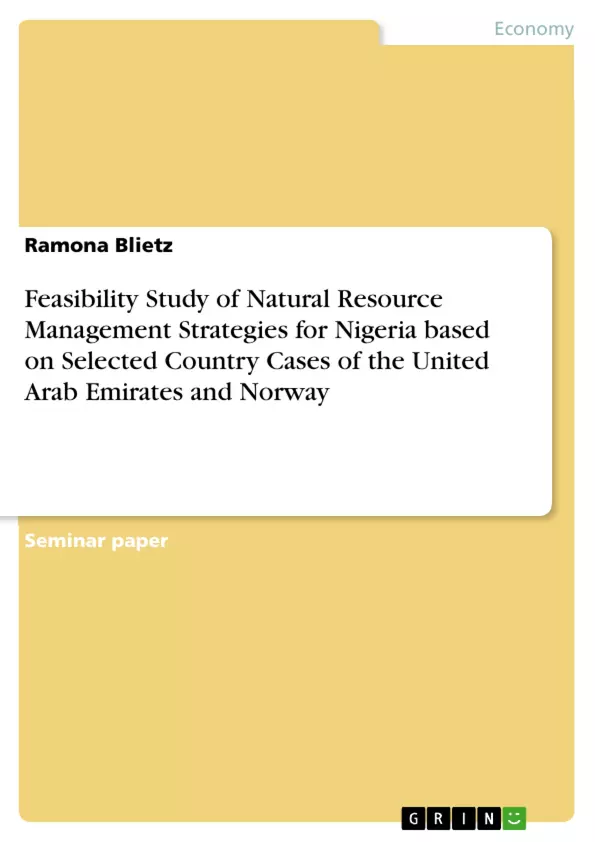When comparing the economic development of resource-poor and resource-rich countries, it seems quite surprising that the majority of resource-abundant countries perform worse than resource-poor countries. A large amount of academic research has been conducted on this unusual phenomenon and it was given the name ‘Resource Curse’. The theory states that there is an inverse relationship between a country’s natural resource endowment and its economic development.
In this study, two countries that have, according to the general academic consensus, despite their resource-abundance had a prosperous economic development and thus supposedly managed their natural resources well.
The United Arab Emirates (UAE) and Norway are often cited examples of how to avoid or escape the natural resource curse. But the question is what their key management strategies are and whether those can be transferred to and implemented in other resource-abundant countries that suffer from the Resource Curse?
In order to find answers to these questions, after analyzing the UAE and Norway, both countries will be compared to Nigeria, known to have a lot of difficulties with its natural resource wealth and consequently struggles economically.
The overall purpose is to check different ways of dealing with natural resources efficiently and examine whether Nigeria could possibly escape the Resource Curse by adopting some of these strategies used by Norway or the UAE.
Inhaltsverzeichnis (Table of Contents)
- Introduction
- Methodology
- Literature Review
- Resource Curse
- How to escape/avoid the resource curse?
- The United Arab Emirates
- Economic development
- Macro economy
- Macroeconomic policies
- Other instruments of the Government
- Social development
- Economic development
- Norway
- Macro economy
- Government Pension Fund Global
- Nigeria
- Development
- Feasibility study for Nigeria
Zielsetzung und Themenschwerpunkte (Objectives and Key Themes)
The primary objective of this study is to examine the strategies used by resource-abundant countries, specifically the United Arab Emirates (UAE) and Norway, to avoid or escape the "Resource Curse" and to assess the feasibility of applying these strategies to Nigeria, a country struggling economically despite its natural resource wealth.
- The Resource Curse and its economic and social consequences
- The management of natural resources, particularly oil and gas
- Case studies of the UAE and Norway, focusing on their strategies for successful resource management
- Analysis of Nigeria's challenges in managing its natural resource wealth
- Evaluation of the potential for Nigeria to adopt strategies employed by the UAE and Norway
Zusammenfassung der Kapitel (Chapter Summaries)
- Introduction: This chapter introduces the "Resource Curse" phenomenon, highlighting the paradox of resource-rich countries often experiencing worse economic performance than resource-poor countries. The study focuses on the UAE and Norway as examples of successful resource management and explores the potential transferability of their strategies to Nigeria.
- Methodology: This chapter outlines the research approach employed, including a literature review on the Resource Curse, qualitative analysis of case studies, and the use of quantitative data. The chapter also acknowledges potential limitations due to data availability.
- Literature Review: This chapter delves into the theoretical framework of the Resource Curse, presenting various economic symptoms and explanations related to its emergence, causes, and effects. It discusses key issues such as currency appreciation (Dutch Disease), volatility of resource prices, unequal expertise, and weak institutions.
- The United Arab Emirates: This chapter examines the UAE's economic development, including its macroeconomic performance, macroeconomic policies, and other government instruments. It also touches upon the country's social development.
- Norway: This chapter focuses on Norway's macroeconomic performance and its successful management of natural resource revenues through the Government Pension Fund Global.
- Nigeria: This chapter explores Nigeria's development challenges and examines the feasibility of applying strategies from the UAE and Norway to address its resource management issues.
Schlüsselwörter (Keywords)
This study focuses on the Resource Curse, natural resource management, economic development, case studies, the United Arab Emirates, Norway, Nigeria, oil and gas, macroeconomic policies, social development, and the feasibility of transferring successful resource management strategies.
Frequently Asked Questions
What is the "Resource Curse"?
The Resource Curse describes a phenomenon where countries with an abundance of natural resources often experience slower economic development and worse social outcomes than resource-poor countries.
Why were Norway and the UAE chosen for this study?
Both countries are widely considered successful examples of managing natural resource wealth (oil and gas) to build prosperous economies and stable societies.
What is the specific challenge for Nigeria mentioned in the paper?
Nigeria struggles economically despite its vast natural resources, facing issues like weak institutions, price volatility, and the "Dutch Disease," making it a primary candidate for studying resource management improvements.
What is the Government Pension Fund Global?
It is Norway's sovereign wealth fund, used to manage and invest revenues from oil and gas for the long-term benefit of the population and future generations.
Can Norway's strategies be directly applied to Nigeria?
The study evaluates the feasibility of transferring these strategies, noting that while the models are successful, implementation depends heavily on a country's specific institutional and political context.
- Quote paper
- Ramona Blietz (Author), 2014, Feasibility Study of Natural Resource Management Strategies for Nigeria based on Selected Country Cases of the United Arab Emirates and Norway, Munich, GRIN Verlag, https://www.grin.com/document/319843



